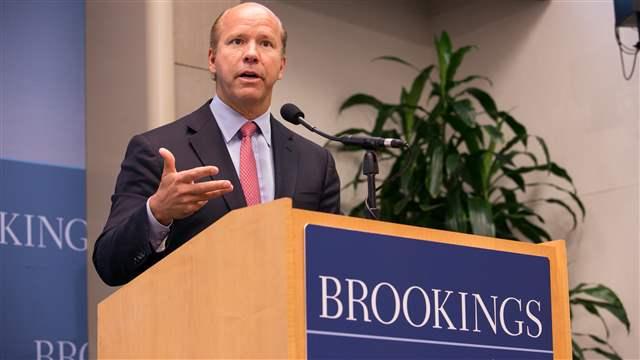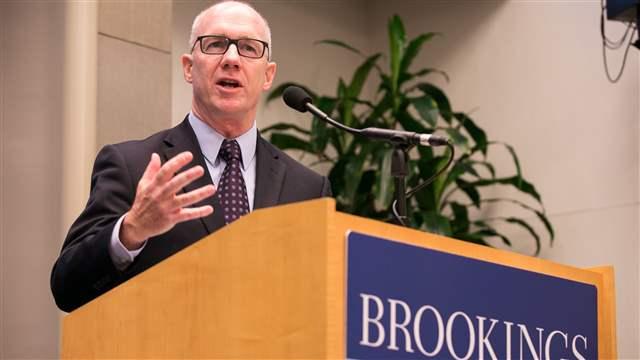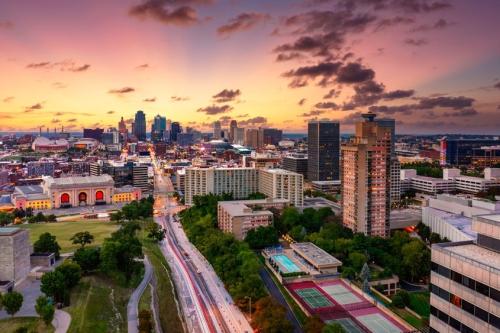At the concluding event to Infrastructure Week 2014, focusing on what’s next in American infrastructure, Brookings’s Metropolitan Policy Program gathered public and private sector leaders to highlight innovations happening around the country. The main takeaway of the event, and throughout the week, was that building partnerships is the key to a bright future for America’s infrastructure.
 Representative John Delaney (D-MD) kicked off the event by declaring that “increasing the infrastructure investment in the United States should be the top domestic priority.” Rep. Delaney said that he is focused on supporting a national public/private partnership to fund infrastructure projects. The congressman detailed three reasons why U.S. infrastructure is his priority:
Representative John Delaney (D-MD) kicked off the event by declaring that “increasing the infrastructure investment in the United States should be the top domestic priority.” Rep. Delaney said that he is focused on supporting a national public/private partnership to fund infrastructure projects. The congressman detailed three reasons why U.S. infrastructure is his priority:
- Investing in infrastructure supports “middle skill” jobs that have been diminishing over the last several years.
- World class infrastructure is critical for global competition.
- Investments in infrastructure “pencil out,” making good financial sense.
 Although the federal government can act as a catalyst for helping to finance the costs of repairing and building infrastructure, Greg Kelly, the Global COO of Parsons Brinckerhoff, noted the most innovative ideas for spending the money originate at the local level, where cities act as “petri dishes of experimentation.” In particular, he referred to the resurgence of light rail and the rapid adoption of bike sharing programs throughout the country.
Although the federal government can act as a catalyst for helping to finance the costs of repairing and building infrastructure, Greg Kelly, the Global COO of Parsons Brinckerhoff, noted the most innovative ideas for spending the money originate at the local level, where cities act as “petri dishes of experimentation.” In particular, he referred to the resurgence of light rail and the rapid adoption of bike sharing programs throughout the country.
The event also featured short presentations from innovative young leaders who are fundamentally rethinking America’s critical infrastructure systems and setting an example for replication not only throughout the U.S., but throughout the world.
- Dan Kinkead, director of projects for Detroit Future City, focused on the challenges of strengthening infrastructure in Detroit where more than 40 percent of the population lives in poverty. “The issues that Detroit is facing today,” he said, “could be lessons for those in Lagos, for Johannesburg, for Mumbai. These things matter, they matter globally.”
- Shalini Vajjhala, founder and chief executive officer at re:Focus Partners, addressed the challenge of managing drainage in cities by making them “work like a sponge” to prevent damage that flooding inflicts on buildings, sewer systems, and waterways.
- Shin-pei Tsay, director of research and development with TransitCenter, focused on the growing demand for shared-use mobility to meet peoples’ diverse transportation needs.
- Eric Shaw, director of community and economic development for the Salt Lake City Corporation, detailed the challenges of coordinating different forms of public transportation within the same city.
Brookings Senior Fellow Rob Puentes‘ latest research reinforces that infrastructure is much more than just roads and bridges. More than 11 percent of the American workforce has an infrastructure job in one of infrastructure’s seven sectors and that is expected to increase by more than 9 percent during the next decade. Rep. Delaney optimistically concluded his remarks by saying that he looks forward to Infrastructure Week in the next 10 or 15 years when “we’re celebrating all the success we’ve had.”
Watch the full event video and video clips here.
Learn more about the 14.2 million infrastructure workers here.



Commentary
Infrastructure’s Future Relies on Successful Partnerships
May 19, 2014